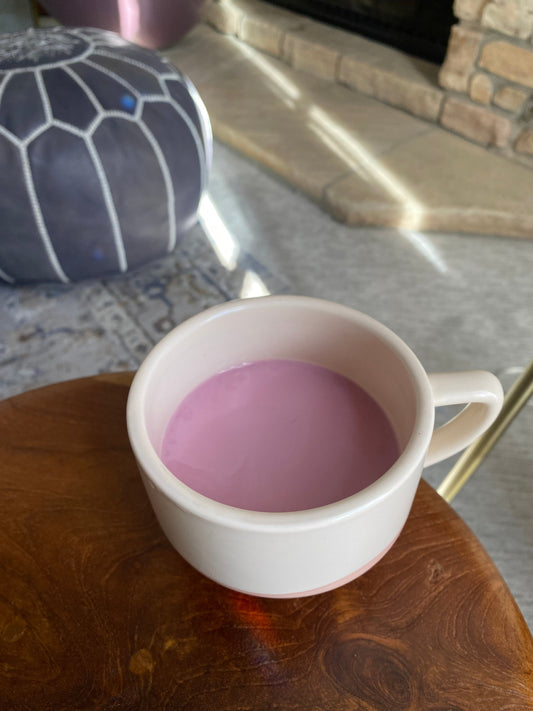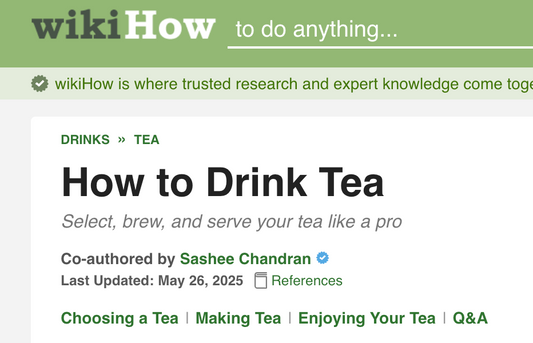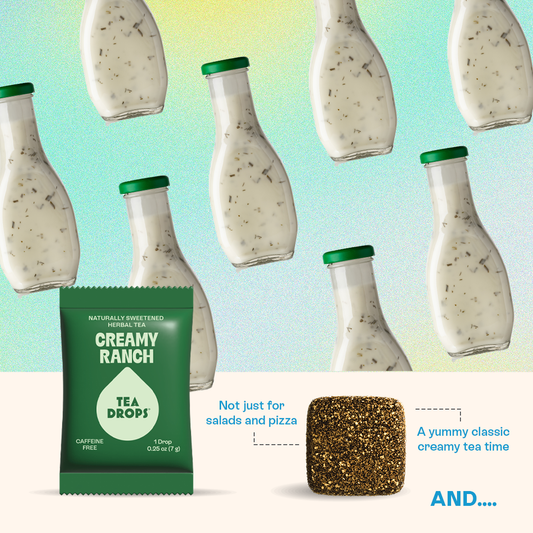
While the idea of your small baby sipping tea may seem strange at first, chamomile can actually have huge potential in helping your little one settle down and get some shut-eye. A known soother, chamomile tea is brimming with healing properties and natural sedative vibes making it one of the most calming herbal teas on the planet. But of course, parents will want to know first and foremost whether or not it is safe to give their babe a chamomile brew, and answering that is exactly what we are here to do. Keep reading to find out if chamomile tea for babies is a brilliant idea or cause for pause.
Is Chamomile Tea Safe for Your Baby?
Before we dive in, it's worth noting that the information included here is not designed to be medical advice. We have done our best to collect and curate the facts but it is still no substitution for checking in with your medical professional or your pediatrician.
Made from dried chamomile flowers steeped in hot water, chamomile tea is a herbal drink (also known as a tisane). Naturally caffeine-free and found to be a soothing tonic that contributes to good sleep, it’s no surprise that this pretty plant is believed to be a beautiful remedy for helping to settle babies.
Chamomile tea has been found to be totally safe for babies and even comes with a boost of bright health benefits too thanks to this tea being a powerhouse of minerals and antioxidants. Doctors do recommend waiting until your child is at least six months old before giving them chamomile and starting with very small doses only at first.
Chamomile is ripe with essential vitamins, anti-bacterial properties, immune-boosting goodness, and minerals like calcium and folate acid too. All these ingredients can help your baby to build a good immune system and can even lend a hand in helping combat colic and other issues that can cause your child to fuss.
How Much Chamomile Tea Should You Give Your Baby?
Gently does it when it comes to giving your little one chamomile tea to help them settle. As with anything you introduce to your baby it is essential to start by taking it slow. All babies (and all people) react differently so by giving a taster test to start with, you are making sure that your child doesn’t have an adverse reaction. Before you bring in chamomile tea check with your pediatrician and when given the green light you could start with 15 ML to play it safe and see how your child tolerates the tea.
While the studies on chamomile tea and how much is good for babies could benefit from more up-to-date research, studies show that 5 OZ of tea 3 times a day is considered to be a safe level for babies and small children.
How to Give Chamomile Tea to Your Baby?
As mentioned, babies under six months of age should wait until after they are not exclusively breastfeeding or on a solo formula or breastmilk diet before you give them any kind of tea including chamomile. You can start to open up to chamomile tea for your baby when you introduce other liquids like water or juice. Make sure that you only use chamomile tea in tea bags rather than the loose-leaf variety as sometimes loose tea leaves have a small risk of being contaminated. You should also avoid chamomile tea with additional flavorings.
Of course, babies and hot liquid is never a good idea so make sure you let the tea cool to a tolerable temperature before giving it to your baby or young children.
What are the Health Benefits of Chamomile Tea for Babies?
So we know that chamomile tea is pretty much considered safe for babies but what are the exact health benefits we can expect? Overall, the health benefits from chamomile tea are similar to those that adults enjoy but to help paint a better picture we have broken down the good stuff into baby-sized chunks.
Ease Colic and Fussiness
Any new parent knows that colic is no fun for anyone. Colic is a common form of discomfort in babies that can lead to sleepless nights, constant crying, and the inability to settle. As rest is so important for babies and for parents, chamomile could help. Back in the early nineties, there was a study done on colic and herbal teas (including chamomile) and the results found that 57% of infants were less fussy than before.
Relaxed Digestion
Anyone who has sipped a cup of chamomile after a heavy meal or when their stomach felt weird will know that this floral brew is a carminative herb and can keep your digestive system feeling fine. Chamomile is known to reduce discomfort from gas and stomachache and can encourage regular toilet habits too, helping reduce the risks of constipation or any gastrointestinal issues in children and babies. As there is also the potential for colic to be related to digestive issues, chamomile tea can truly hit all the nails on the head.
Sleep Aid
There’s a reason chamomile tea is considered to be a bedtime balm. This brew is one of nature’s natural mild sedatives, helping to relax both the body and the mind. Chamomile contains apigenin, a compound that helps the muscles to relax. Chamomile can encourage your baby to relax before bed and drift into a gentle sleep thanks to the herb's calming effect. Giving your baby a little chamomile tea before bed could also encourage them to sleep for longer and can encourage a consistent sleep schedule. For teething babies, it can also help as it works as a mild pain reliever too.
Prevent Infections
Brimming with anti-bacterial and anti-inflammatory properties, chamomile can also lend a hand when it comes to helping your baby stave off infection and diseases. As a baby's immune system develops over time it's super helpful to do all you can in helping build this up. Chamomile can boost the immune system, helping your baby to stay healthy.
Common Cold Symptom Relief
It’s not uncommon for small children to catch sniffles and coughs especially when their immune system is developing and they are around other children. As chamomile is great at encouraging sleep and bringing anti-inflammatory properties to the table, this precious plant can ease the side effects of the common cold. From relieving upper respiratory discomfort to helping the body stay hydrated and soothing sore throats, there are many ways in which chamomile decides to lend a healing hand.

Possible Side Effects of Chamomile Tea
There have been no significant side effects linked to chamomile tea consumption in babies which is good news for parents looking to try this brew out. However, as with anything, there is always a small chance of allergic reactions. The first time you try chamomile tea on your child it's worth checking for signs of an allergy or sensitivity. Remember, always check with your pediatrician before introducing anything to your baby's diet and when you get the go-ahead – start small.
Knowing the signs of chamomile sensitivity or allergy can help you to understand what your baby needs. Here are some of the symptoms of an allergy to chamomile tea:
- Itchiness around the mouth
- Skin rash or swelling of the face
- Nausea
- Diarrhea
- Lethargy
How To Prepare Chamomile Tea For Babies
Prepping chamomile tea for babies is as easy as 1,2,3 - although you need to make sure that you use the cleanest purest chamomile you can find. Organic chamomile or chamomile in a tea bag is best rather than dried chamomile.
- Boil water in a kettle or saucepan.
- Add a chamomile tea bag.
- Let the tea cool for at least ten minutes until tepid.
- Pour into a bottle or dropper for your baby.
Wrap Up
Whether you have a colicky fussy baby or if you just want to boost your precious babe's immune system and keep them chill, chamomile tea could be an excellent addition to their daily routine. As studies have shown that this pretty daisy-like plant brings plenty of benefits to both baby and parent, there’s no reason why you can’t both cuddle up with a cup of chamomile bedtime tea. Remember, each child is uniquely and sweetly different so checking in with their own pediatrician is essential business before brewing up. And if it’s this good for babies, it’s also amazing for adults who need to boost their rest, relaxation, and energy reviving sleep.
**Medical Disclaimer: The information in this article is for informative purposes only and shouldn’t be taken as medical advice. Those who have any health-related queries should be sure to reach out to a medical professional. These statements have not been evaluated by the Food and Drug Administration. This article is not intended to diagnose, treat, cure, or prevent any disease.









